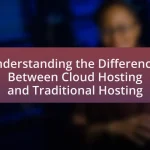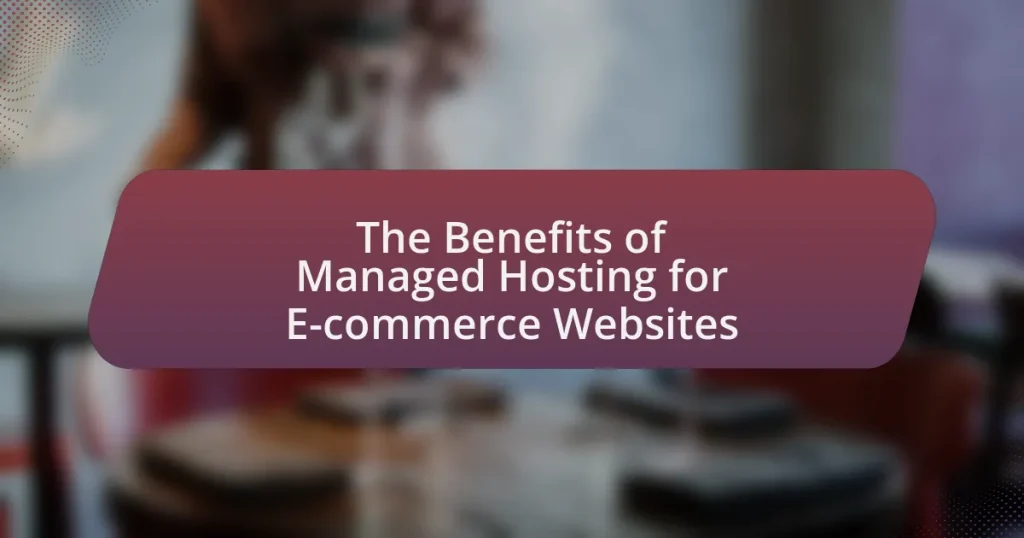Managed hosting for e-commerce websites is a specialized service that manages all technical aspects of server operations, allowing businesses to concentrate on sales. This article outlines the differences between managed and traditional hosting, highlighting key features such as dedicated resources, expert support, automatic backups, and enhanced security. It emphasizes the importance of managed hosting in ensuring optimal performance, security, and reliability for e-commerce platforms, which are critical for customer satisfaction and business growth. Additionally, the article discusses the benefits of scalability, cost-effectiveness, and strategies for optimizing managed hosting to enhance user experience and accommodate traffic fluctuations.
What is Managed Hosting for E-commerce Websites?
Managed hosting for e-commerce websites is a service where a hosting provider takes care of all technical aspects of server management, allowing businesses to focus on their online sales. This includes server setup, maintenance, security, and performance optimization tailored specifically for e-commerce platforms. Managed hosting ensures high uptime, fast loading speeds, and robust security measures, which are critical for online transactions. According to a study by Statista, 79% of online shoppers who experience performance issues are less likely to return to the site, highlighting the importance of reliable hosting solutions for e-commerce success.
How does Managed Hosting differ from traditional hosting?
Managed hosting differs from traditional hosting primarily in the level of management and support provided. In managed hosting, the service provider takes care of server management, maintenance, security, and updates, allowing businesses to focus on their core operations. In contrast, traditional hosting typically requires users to manage their own servers, which includes handling technical issues, software updates, and security measures. This distinction is crucial for e-commerce websites, as managed hosting can enhance performance and security, leading to improved customer experiences and reduced downtime.
What are the key features of Managed Hosting?
Managed hosting offers several key features, including dedicated resources, expert support, automatic backups, and enhanced security. Dedicated resources ensure that clients have exclusive access to server capabilities, which improves performance and reliability. Expert support provides 24/7 assistance from knowledgeable professionals, allowing for quick resolution of technical issues. Automatic backups safeguard data by regularly creating copies, minimizing the risk of data loss. Enhanced security measures, such as firewalls and intrusion detection systems, protect sensitive information from cyber threats. These features collectively contribute to a more efficient and secure hosting environment, particularly beneficial for e-commerce websites that require high availability and data integrity.
Why is Managed Hosting important for e-commerce?
Managed hosting is important for e-commerce because it ensures optimal performance, security, and reliability for online stores. E-commerce platforms require high uptime and fast loading speeds to enhance user experience and drive sales; managed hosting providers typically offer dedicated resources and expert support that help maintain these critical aspects. Additionally, managed hosting includes robust security measures, such as firewalls and regular backups, which protect sensitive customer data and comply with regulations like PCI DSS. This combination of performance, security, and support makes managed hosting a vital choice for e-commerce businesses aiming to succeed in a competitive market.
What are the primary benefits of Managed Hosting for E-commerce Websites?
The primary benefits of Managed Hosting for E-commerce Websites include enhanced performance, improved security, and dedicated support. Enhanced performance is achieved through optimized server configurations and resources tailored for high traffic, which is crucial for e-commerce sites that experience fluctuating visitor volumes. Improved security is provided by regular updates, firewalls, and monitoring services that protect sensitive customer data and transactions. Dedicated support ensures that technical issues are resolved quickly, minimizing downtime and maintaining a seamless shopping experience for customers. These benefits collectively contribute to higher customer satisfaction and increased sales potential for e-commerce businesses.
How does Managed Hosting enhance website performance?
Managed Hosting enhances website performance by providing dedicated resources and optimized server configurations tailored to specific website needs. This approach minimizes downtime and ensures faster load times, as resources are not shared with other users, leading to improved user experience and higher conversion rates. Additionally, Managed Hosting often includes performance monitoring and automatic updates, which further optimize site speed and reliability. Studies show that websites with faster load times can see conversion rate increases of up to 7% for every second of improvement, highlighting the significant impact of Managed Hosting on e-commerce performance.
What security advantages does Managed Hosting provide?
Managed Hosting provides enhanced security advantages through dedicated resources, expert management, and proactive monitoring. This type of hosting typically includes features such as firewalls, DDoS protection, and regular security updates, which are crucial for safeguarding sensitive e-commerce data. Additionally, managed hosting providers often implement strict access controls and data encryption, ensuring that customer information remains secure. According to a study by the Ponemon Institute, organizations that utilize managed hosting services experience 50% fewer security incidents compared to those using unmanaged solutions, highlighting the effectiveness of these security measures.
How does Managed Hosting improve customer support for e-commerce businesses?
Managed Hosting improves customer support for e-commerce businesses by providing dedicated technical assistance and optimized server performance. This service ensures that e-commerce platforms experience minimal downtime, which is crucial for maintaining customer satisfaction and trust. According to a study by the Aberdeen Group, companies that utilize managed hosting solutions can achieve up to 99.99% uptime, significantly reducing the likelihood of lost sales due to website outages. Furthermore, managed hosting providers often offer 24/7 support, allowing e-commerce businesses to resolve issues quickly and efficiently, thereby enhancing the overall customer experience.
How does Managed Hosting impact e-commerce growth?
Managed hosting significantly enhances e-commerce growth by providing reliable performance, improved security, and expert support. Reliable performance ensures that online stores experience minimal downtime and fast loading speeds, which are critical for retaining customers; studies show that a one-second delay in page load time can lead to a 7% reduction in conversions. Improved security measures protect sensitive customer data, fostering trust and compliance with regulations like GDPR, which is essential for maintaining a loyal customer base. Additionally, expert support allows e-commerce businesses to focus on their core operations while technical issues are handled efficiently, leading to better resource allocation and strategic growth.
What role does scalability play in Managed Hosting?
Scalability is crucial in Managed Hosting as it allows e-commerce websites to efficiently adjust their resources based on fluctuating traffic demands. This flexibility ensures that businesses can accommodate growth during peak times, such as holiday sales, without compromising performance or user experience. For instance, a study by Statista indicates that e-commerce sales can increase by over 30% during peak seasons, highlighting the need for scalable solutions to handle such surges. Managed Hosting providers typically offer scalable infrastructure, enabling businesses to seamlessly upgrade or downgrade their resources, which is essential for maintaining operational efficiency and customer satisfaction.
How can Managed Hosting accommodate traffic spikes during sales?
Managed Hosting can accommodate traffic spikes during sales by providing scalable resources that adjust to increased demand. This scalability is achieved through cloud infrastructure, which allows for the dynamic allocation of bandwidth and server capacity as traffic surges. For instance, during peak sales events, Managed Hosting services can automatically increase server resources to handle the influx of visitors, ensuring website performance remains optimal. Additionally, features like load balancing distribute incoming traffic across multiple servers, preventing any single server from becoming overwhelmed. This capability is crucial for e-commerce websites, as it minimizes downtime and enhances user experience, ultimately leading to higher conversion rates during critical sales periods.
What are the long-term cost benefits of using Managed Hosting?
The long-term cost benefits of using Managed Hosting include reduced operational expenses, enhanced resource allocation, and minimized downtime costs. Managed Hosting providers handle server maintenance, security, and updates, which decreases the need for in-house IT staff and associated salaries. This outsourcing allows businesses to focus on core activities, leading to better resource utilization. Additionally, Managed Hosting typically offers robust security measures and performance optimizations that reduce the risk of costly downtime; for instance, studies show that downtime can cost businesses an average of $5,600 per minute. By ensuring high availability and performance, Managed Hosting can significantly lower these potential losses over time.
How does Managed Hosting contribute to better user experience?
Managed Hosting enhances user experience by providing optimized performance, reliability, and security for e-commerce websites. This type of hosting ensures that websites load quickly, which is crucial as studies show that a one-second delay in page load time can lead to a 7% reduction in conversions. Additionally, Managed Hosting includes proactive monitoring and maintenance, minimizing downtime and ensuring that users can access the site without interruptions. Furthermore, it often incorporates advanced security measures, such as firewalls and regular backups, which protect sensitive customer data and build trust. These factors collectively contribute to a seamless and secure shopping experience, ultimately leading to higher customer satisfaction and retention.
What features of Managed Hosting enhance site speed and reliability?
Managed hosting enhances site speed and reliability through features such as dedicated resources, optimized server configurations, and proactive monitoring. Dedicated resources ensure that websites have exclusive access to CPU, RAM, and bandwidth, which minimizes competition for resources and leads to faster load times. Optimized server configurations, tailored specifically for the website’s technology stack, improve performance by reducing latency and enhancing data processing speeds. Proactive monitoring allows for real-time performance tracking and immediate response to potential issues, ensuring high uptime and reliability. These features collectively contribute to a seamless user experience, which is crucial for e-commerce websites.
How does Managed Hosting support mobile optimization for e-commerce?
Managed Hosting supports mobile optimization for e-commerce by providing scalable resources, enhanced performance, and specialized support tailored for mobile users. This hosting solution ensures that e-commerce websites can handle varying traffic loads, particularly during peak shopping times, which is crucial for mobile users who expect fast loading times. According to Google, 53% of mobile users abandon sites that take longer than three seconds to load, highlighting the importance of speed in mobile optimization. Managed Hosting also includes features like Content Delivery Networks (CDNs) that distribute content closer to users, further improving load times and user experience on mobile devices. Additionally, managed service providers often offer expert guidance on mobile-friendly design and optimization strategies, ensuring that e-commerce sites are not only functional but also visually appealing on smaller screens.
What should e-commerce businesses consider when choosing Managed Hosting?
E-commerce businesses should consider scalability, security, support, and performance when choosing managed hosting. Scalability ensures that the hosting solution can grow with the business, accommodating increased traffic and transactions, which is crucial during peak shopping seasons. Security is vital, as e-commerce sites handle sensitive customer data; thus, features like SSL certificates, firewalls, and regular backups are essential. Reliable support is necessary to resolve issues quickly, as downtime can lead to significant revenue loss; a hosting provider should offer 24/7 customer service. Lastly, performance, including fast loading times and uptime guarantees, directly impacts user experience and conversion rates, making it a critical factor in the decision-making process.
What factors influence the selection of a Managed Hosting provider?
The selection of a Managed Hosting provider is influenced by several key factors, including reliability, performance, customer support, security, scalability, and pricing. Reliability is crucial as it ensures minimal downtime, which is vital for e-commerce operations; for instance, a study by Gartner indicates that even a minute of downtime can cost businesses thousands in lost revenue. Performance is also essential, as faster loading times enhance user experience and can improve conversion rates; research shows that a one-second delay in page load time can lead to a 7% reduction in conversions. Customer support is important for resolving issues quickly, with 24/7 availability being a significant advantage. Security features, such as SSL certificates and DDoS protection, are critical to protect sensitive customer data. Scalability allows businesses to grow without changing providers, and competitive pricing ensures that the service fits within budget constraints while still meeting the necessary requirements.
How important is customer support in choosing a Managed Hosting service?
Customer support is critically important when choosing a Managed Hosting service. Effective customer support ensures that any technical issues are resolved quickly, minimizing downtime and maintaining the performance of e-commerce websites. According to a survey by Zendesk, 82% of customers have stopped doing business with a company due to poor customer service, highlighting the direct impact of support on customer retention and satisfaction. Additionally, managed hosting services often cater to businesses that require immediate assistance, making responsive and knowledgeable support essential for operational success.
What are the common pitfalls to avoid when selecting Managed Hosting?
When selecting Managed Hosting, common pitfalls to avoid include underestimating the importance of scalability, overlooking the level of customer support, and failing to evaluate security measures. Scalability is crucial as e-commerce websites often experience fluctuating traffic; a hosting provider that cannot accommodate growth can lead to downtime and lost revenue. Customer support is vital because technical issues can arise at any time; providers with limited support options can hinder timely resolutions. Additionally, security measures must be thoroughly assessed, as e-commerce sites are prime targets for cyberattacks; inadequate security can result in data breaches and loss of customer trust.
What are the best practices for optimizing Managed Hosting for e-commerce?
The best practices for optimizing Managed Hosting for e-commerce include ensuring high uptime, implementing robust security measures, utilizing a Content Delivery Network (CDN), optimizing website speed, and providing scalable resources. High uptime is critical as e-commerce sites must be accessible at all times; a study by Gartner indicates that even a minute of downtime can cost businesses thousands in lost revenue. Robust security measures, such as SSL certificates and regular backups, protect sensitive customer data, which is essential for maintaining trust and compliance with regulations like GDPR. Utilizing a CDN enhances website speed and performance by distributing content closer to users, which can improve load times by up to 50%, according to Akamai. Optimizing website speed through techniques like image compression and minimizing HTTP requests directly impacts user experience and conversion rates, with research from Google showing that a one-second delay can reduce conversions by 20%. Lastly, providing scalable resources allows e-commerce businesses to handle traffic spikes during peak times, ensuring a seamless shopping experience.
How can e-commerce businesses ensure their Managed Hosting is secure?
E-commerce businesses can ensure their Managed Hosting is secure by implementing robust security measures such as regular software updates, firewalls, and encryption protocols. Regular software updates protect against vulnerabilities by ensuring that the latest security patches are applied, while firewalls act as a barrier against unauthorized access. Additionally, using encryption protocols like SSL/TLS secures data transmission between the server and users, safeguarding sensitive information such as payment details. According to a report by Cybersecurity Ventures, global cybercrime damages are projected to reach $10.5 trillion annually by 2025, highlighting the critical need for e-commerce businesses to prioritize security in their hosting solutions.
What strategies can enhance the performance of Managed Hosting for e-commerce?
To enhance the performance of Managed Hosting for e-commerce, implementing strategies such as optimizing server configurations, utilizing Content Delivery Networks (CDNs), and ensuring regular software updates is essential. Optimizing server configurations can significantly reduce load times and improve user experience, as faster response times directly correlate with higher conversion rates. Utilizing CDNs distributes content across multiple servers globally, which decreases latency and enhances site speed for users regardless of their location. Regular software updates ensure that the hosting environment is secure and efficient, reducing vulnerabilities that could lead to downtime or data breaches. These strategies collectively contribute to a more reliable and efficient e-commerce platform, ultimately driving sales and customer satisfaction.










